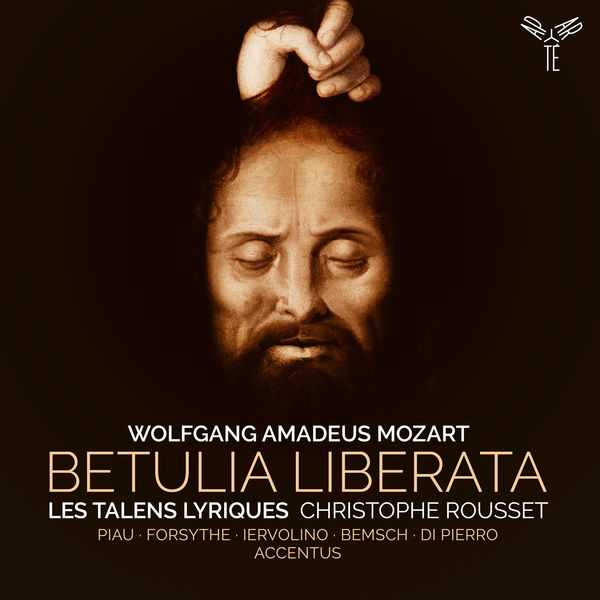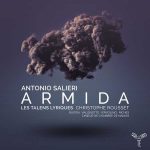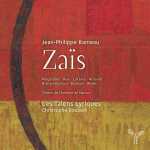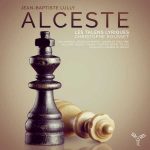

Composer: Wolfgang Amadeus Mozart
Performer: Accentus, Amanda Forsythe, Teresa Iervolino, Nahuel Di Pierro, Pablo Bemsch, Sandrine Piau
Orchestra: Les Talens Lyriques
Conductor: Christophe Rousset
Format: FLAC (tracks)
Label: Aparté
Catalogue: AP235
Release: 2020
Size: 2.38 GB
Recovery: +3%
Scan: yes
Betulia liberata, K. 118
Parte prima
01. Overtura
02. Recitativo “Popoli di Betulia, ah qual v’ingombra” (Ozia)
03. Aria “D’Ogni colpa la colpa maggiore” (Ozia)
04. Recitativo “E in che sperar?” (Cabri, Amital)
05. Aria “Ma qual virtù non cede” (Cabri)
06. Recitativo “Già le memorie antiche” (Ozia, Cabri, Amital)
07. Aria “Non hai cor, se in mezzo a questi” (Amital)
08. Recitativo “E qual pace sperate” (Ozia, Amital, Coro)
09. Aria “Pietà, se irato sei” (Ozia, Coro)
10. Recitativo “Chi è costei, che qual sorgente aurora” (Cabri, Amital, Ozia, Giuditta)
11. Aria “Del pari infeconda” (Giuditta)
12. Recitativo “Oh saggia, oh santa, oh eccelsa donna!” (Ozia, Cabri, Giuditta)
13. Aria “Pietà, se irato sei” (Ozia, Coro)
14. Recitativo “Oh saggia, oh santa, oh eccelsa donna!” (Cabri, Amital, Ozia, Carmi)
15. Aria ” Terribile d’aspetto” (Achior)
16. Recitativo “Ti consola, Achior” (Ozia)
17. Aria “Parto inerme, e non pavento” (Giuditta)
18. “Oh prodigio! Oh stupor!” (Coro)
Parte seconda
19. Recitativo “Troppo mal corrisponde” (Achior, Ozia)
20. Aria “Se Dio veder tu vuoi” (Ozia)
21. Recitativo “Confuso io son” (Ozia, Achior, Amital)
22. Aria “Quel nocchier che in gran procella” (Amital)
23. Recitativo “Lungamente non dura” (Ozia, Amital, Cabri, Coro)
24. Aria “Prigionier che fa ritorno” (Giuditta)
25. Recitativo “io cedo” (Achior, Giuditta, Ozìa, Popoli, Amici)
26. Aria “Te solo adoro” ( Achior)
27. Recitativo “Dia tua vittoria un glorioso effetto” ( Ozia, Amital)
28. Aria “Con troppa rea viltà” (Amital)
29. Recitativo “Quanta cura hai di noi, Bonta Divina!” (Cabri, Carmi, Ozia)
30. Aria “Quei moti che senti” (Carmi)
31. Recitativo “Seguansi, o Carmi, i fuggitivi” (Ozia, Amital, Cabri, Giuditta)
32. “Lodi al gran Dio che oppresse” (Coro)
Composed in 1771 to a libretto by Metastasio tracing the well-known biblical story of Judith and Holofernes, Betulia liberata was Mozart’s first oratorio.
The Assyrians have led siege on Bethulia and its people is losing hope that the city will be freed. Judith, a beautiful and deeply religious widow, succeeds in penetrating the enemy camp and seduces Holofernes, before killing him during his sleep.
Betulia Liberata, K. 118, premiered in 1771, was called an azione sacra. Essentially it is an oratorio, Mozart’s only one, but its libretto by Pietro Metastasio has strongly operatic qualities; there are few choruses, and those that exist are part of the action, not commentaries. The story is based on the biblical tale of the Israelite heroine Judith and her seduction and then decapitation of the enemy general Holofernes. The libretto posed many challenges for the 15-year-old composer: to name a few, the heroine does not make her appearance until well over half an hour into the music; the recitatives are complex, with intricate dialogues and the central event of the plot, Judith’s story of how she happened to return home bearing Holofernes’ severed head, told in one of them; and the characters are sharply delineated, with some of the despairing Israelites counseling surrender. Mozart surmounted these challenges brilliantly, and perhaps more than any other of his early works, this one points the way to the adult genius. Only the unconvincing conclusion points to Mozart’s youth. Director Christophe Rousset and Les Talens Lyriques deliver a performance that catches the leaps and bounds Mozart was making here. The instrumental ensemble and the chorus Accentus are generously sized by contemporary standards, and they realize the large dimensions in which Mozart was thinking. Rousset’s soloists, especially Teresa Iervolino in the title role and Pablo Bemsch as the Israelite prince Ozia, vividly realize the characters; only the voice of Sandrine Piau, as the noblewoman Amital, shows strain. Perhaps the definitive recording of Betulia Liberata, this reading is enhanced by excellent engineering from the Little Tribeca team.



